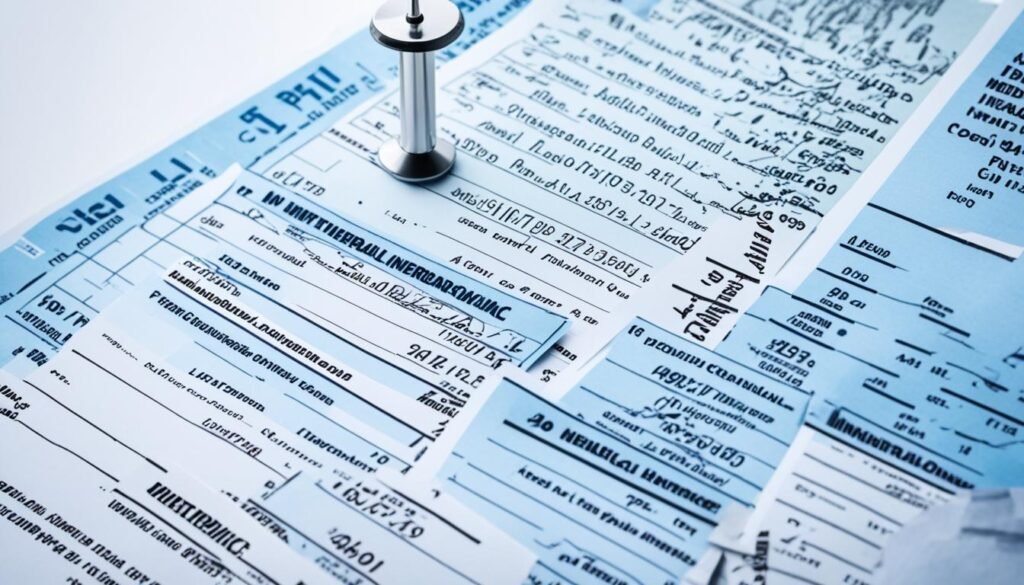Are you confident that your current insurance policies provide enough protection for your assets? If you have auto insurance and homeowners insurance, you may think you’re fully covered. However, accidents and lawsuits can quickly exceed the liability coverage limits of these policies, leaving you vulnerable to financial loss. This is where umbrella insurance comes in.
Umbrella insurance is a type of coverage that extends beyond the limits of your existing auto and homeowners insurance policies. It provides an extra layer of liability coverage, giving you added peace of mind. Whether it’s a severe car accident or a slip-and-fall on your property, umbrella insurance can help protect your assets and future.
How does umbrella insurance work? It acts as a safety net, filling in the gaps when the limits of your other policies are exhausted. In the event of a covered claim, umbrella insurance kicks in and covers the remaining costs, up to the specified coverage limit.
So why do you need umbrella insurance? Your auto and homeowners insurance policies have liability coverage, but they may not be enough to cover all potential accidents and lawsuits. Umbrella insurance provides an extra layer of financial protection. By increasing your liability coverage limits, you can protect your savings, assets, and future income. It’s an affordable way to ensure you’re fully covered in case of unforeseen events.
Don’t leave your financial stability to chance. Consider the benefits of umbrella insurance and take control of your asset protection today.
Also Read : UIUC Study Abroad Adventures
Key Takeaways
- Umbrella insurance provides extra liability coverage beyond the limits of your existing policies.
- It can protect your assets and future income from costly accidents and lawsuits.
- Umbrella insurance acts as a safety net, filling in the gaps when your other policies are exhausted.
- It is a cost-effective way to increase your liability coverage and ensure you’re fully protected.
- Consult with an insurance agent to determine the right coverage limit and get a quote for umbrella insurance.
How Does Umbrella Insurance Work?
An umbrella insurance policy works by providing coverage above and beyond the liability limits of your other insurance policies. It kicks in when the limits of your homeowners, auto, or boat insurance have been reached. For example, if you cause a car accident and the cost of the injuries is $500,000, but your auto insurance only covers $300,000, your umbrella policy will cover the remaining $200,000.
Umbrella insurance can also provide coverage for claims that may be excluded by other liability policies, such as false arrest, libel, slander, and liability coverage on rental units you own. It offers an additional layer of protection beyond the standard coverage provided by your primary insurance policies, ensuring you are adequately protected in case of unforeseen events or accidents.
It is important to note that umbrella policies have their own liability limits, which can range from $1 million to $5 million or more. These limits represent the maximum amount the policy will pay out for covered claims. By having an umbrella policy with higher coverage limits, you can have more financial protection and peace of mind.
Also Read : Low Income Personal Loan Options Explained
Examples of Umbrella Insurance Coverage:
“Umbrella insurance provides an extra layer of protection for personal liability situations. Suppose someone gets injured while visiting your property and decides to sue you for medical expenses and damages. If your homeowners insurance policy has a liability limit of $300,000 and the claim exceeds that amount, your umbrella policy can cover the additional costs, up to its policy limit. This ensures that you are not personally responsible for the excess amount and can avoid significant financial loss.”
Umbrella insurance is a valuable addition to your insurance portfolio, as it provides an extra level of protection and mitigates your personal liability exposure. By extending the coverage limits of your primary insurance policies, umbrella insurance safeguards your assets and future earnings, providing you with peace of mind.
| Key Features of Umbrella Insurance |
|---|
| Provides coverage above and beyond the liability limits of primary insurance policies |
| Covers claims excluded by other liability policies |
| Offers higher coverage limits, ranging from $1 million to $5 million or more |
| Protects personal assets and future earnings |
| Offers peace of mind in case of unforeseen events or accidents |
What Does Umbrella Insurance Cover?

Umbrella insurance provides coverage beyond the limits of your other insurance policies. It offers an additional layer of liability coverage for a wide range of situations, including injuries, property damage, lawsuits, and personal liability situations. Let’s take a closer look at the specific aspects that umbrella insurance covers:
Also Read : Clearcover Insurance: Affordable Coverage Options
Bodily Injury Liability
Umbrella insurance covers injuries sustained by others in accidents where you are at fault. This can include auto accidents, incidents involving your property, or other personal liability situations. It helps protect you from the financial consequences of costly medical bills, rehabilitation expenses, and legal fees that may arise from bodily injuries.
Property Damage Liability
Umbrella insurance also provides coverage for the cost of damage to someone else’s property. Whether it’s damage to their vehicles, personal belongings, or other assets, umbrella insurance steps in to help cover the expenses. This additional protection can save you from significant financial burdens resulting from accidental property damage for which you are liable.
Certain Lawsuits
Umbrella insurance extends coverage to certain lawsuits that may not be covered by other liability policies. This can include legal claims for slander or libel, false arrest or imprisonment, and mental anguish or shock. By having umbrella insurance in place, you are better prepared to defend yourself and mitigate the financial impact of potential legal battles.
Additional Personal Liability Situations
Umbrella insurance provides extra liability coverage that goes beyond what is typically covered by standard insurance policies. It ensures that you are protected in various personal liability situations, offering peace of mind and financial security. With umbrella coverage, you can navigate personal liability risks with greater confidence, knowing that you have an added layer of protection.
Also Read : State Farm Term Life Insurance: Secure Your Future
Who Needs Umbrella Insurance?

Umbrella insurance is important for anyone who wants extra protection and peace of mind. While your homeowners and auto insurance may cover some situations, they have their limits. Umbrella insurance provides coverage beyond those limits and can protect you from financial loss in case of unexpected accidents or lawsuits.
It is especially beneficial for those who have valuable assets to protect, such as a home, vehicles, or investments. Even if you don’t have significant assets, umbrella insurance can still provide essential coverage and protect your future income.
For example, let’s say you are involved in a car accident where the injuries are severe, and you are found liable for damages. If your auto insurance policy has a liability coverage limit of $300,000, but the total damages amount to $500,000, you would be responsible for the remaining $200,000 without umbrella insurance. However, if you have an umbrella policy with a coverage limit that exceeds $200,000, the additional amount would be covered by your umbrella insurance, saving you from potential financial hardship.
Ultimately, umbrella insurance is a wise choice for individuals who want to ensure comprehensive insurance coverage and protect their financial well-being. By consulting with an insurance agent, you can determine if umbrella insurance is right for you and obtain a personalized quote based on your specific insurance needs and coverage requirements.
| Who Benefits from Umbrella Insurance? |
|---|
| Homeowners with valuable properties and assets |
| Car owners who want additional liability coverage |
| Individuals with a high risk of lawsuits |
| Business owners who want to protect their personal assets |
| Anyone who wants extra peace of mind and financial security |
Also Read : Explore Short Term Life Insurance Options
How Much Does Umbrella Insurance Cost?

The cost of umbrella insurance depends on various factors, such as the coverage limit you choose, your location, the types of vehicles you own, and other risk factors. When determining the cost of umbrella insurance, insurance providers consider these factors to assess the level of risk associated with your policy.
Generally, umbrella insurance is affordable, with premiums ranging from a few hundred dollars to a few thousand dollars per year. The actual cost may vary depending on your individual circumstances and the specific insurance policies you hold.
In addition to the coverage limit, the cost of umbrella insurance can also be influenced by the deductibles and coverage limits of your underlying homeowners and auto insurance policies. For example, if you have higher deductible amounts on your underlying insurance policies, you may see a decrease in the cost of your umbrella insurance premiums.
Insurance providers may offer discounts if you bundle your umbrella insurance with other policies, such as homeowners or auto insurance. Additionally, having a good claims history may make you eligible for lower premiums.
To determine the cost of umbrella insurance for your specific circumstances, it is recommended to contact an insurance agent. They can provide you with a personalized quote based on your coverage needs, underlying insurance policies, and individual risk factors.
Factors Affecting Umbrella Insurance Cost:
- Coverage limit chosen
- Location
- Types of vehicles owned
- Deductibles and coverage limits of underlying insurance policies
- Bundling discounts
- Claims history
Example Premium Range for Umbrella Insurance:
| Coverage Limit | Annual Premium Range |
|---|---|
| $1 million | $300 – $600 |
| $2 million | $500 – $900 |
| $5 million | $800 – $1,200 |
How to Determine the Right Coverage Limit

When it comes to choosing the right coverage limit for your umbrella insurance policy, several factors need to be considered. By evaluating your assets, future income, and potential risks, you can ensure that your coverage adequately protects your financial well-being. Here are some key considerations:
- Assess Your Assets: Start by calculating the total value of your assets, which may include your home, vehicles, investments, and savings. These assets represent your financial worth and are important to consider when determining the appropriate coverage limit for your umbrella policy.
- Consider Future Income Potential: Think about your future income and its potential growth. Assessing your future income can help you understand the potential loss you may face in case of unexpected accidents or lawsuits. It’s essential to ensure that your coverage limit adequately protects your earning potential.
- Evaluate Potential Risks: Analyze the risks you may face in your everyday life that could result in costly lawsuits or liabilities. Factors such as being a homeowner, having a long commute, owning a dog, or frequently hosting guests can increase your risk. By identifying potential risks, you can determine the level of protection you need.
Hiring an experienced insurance agent can be immensely helpful in assessing these factors and determining the right coverage limit for your specific situation. They can provide valuable insights and guidance based on their expertise in the field.
Remember, having appropriate umbrella insurance coverage is crucial for protecting your assets and future financial stability. Take the time to evaluate your unique circumstances and consult with an insurance professional to make an informed decision.
How to Obtain Umbrella Insurance

Obtaining umbrella insurance requires having certain underlying insurance policies in place. Typically, these include:
- Auto insurance with a minimum liability coverage limit
- Homeowners or renters insurance with personal liability coverage
The specific requirements may vary among insurance companies, but they generally involve meeting certain liability limits. For example, on your auto insurance policy, you may need liability limits of at least $250,000 per person and $500,000 per accident. On your homeowners or renters insurance policy, you may need personal liability coverage of $500,000 or more.
It’s important to note that some insurance providers may require you to have all your policies, including umbrella insurance, with them. To determine the exact requirements and obtain a quote for umbrella insurance coverage, you can reach out to an insurance agent or contact the insurance company directly.
Note: Obtaining umbrella insurance requires having underlying insurance policies such as auto insurance and homeowners or renters insurance with specific liability coverage.
What Umbrella Insurance Doesn’t Cover

While umbrella insurance provides extensive coverage, it’s important to be aware of certain exclusions. Understanding these exclusions will help you make informed decisions about your insurance coverage. Here are some key things that umbrella insurance generally doesn’t cover:
- Intentional Acts: Umbrella policies typically do not cover intentional acts committed by the insured. This includes deliberate damage or harm caused by the insured individual.
- Crimes: Umbrella insurance does not provide coverage for criminal acts committed by the insured.
- Healthcare Costs: Umbrella policies are not designed to provide excess health insurance coverage or cover healthcare costs.
- Excluded Activities: Certain activities may be excluded from coverage under umbrella insurance. This can include high-risk activities such as extreme sports or recreational motor vehicles.
It’s essential to review the terms and conditions of your umbrella insurance policy carefully to understand what is and isn’t covered. Make sure to consult with your insurance agent if you have specific concerns or need coverage for a particular event. They can help you explore additional insurance policies that may provide the necessary protection.
Also Read : How To Become An Actuary Your Career Guide Step-by-step
Conclusion
Umbrella insurance is a valuable coverage option that provides additional protection and peace of mind. It extends beyond the limits of your existing insurance policies, covering injuries, property damage, lawsuits, and personal liability situations. Whether you have valuable assets to protect or simply want added security, umbrella insurance can help safeguard your financial future.
By considering your assets, potential risks, and future income, you can determine the appropriate coverage limit for your umbrella policy. This ensures that you have sufficient coverage to protect your assets and minimize the risk of financial loss. With umbrella insurance, you can have peace of mind knowing that you have an extra layer of liability coverage in case of unexpected accidents or legal claims.
Although umbrella insurance has exclusions and limitations, it offers significant benefits. It can provide crucial asset protection and help protect you from potential lawsuits that may arise. However, it is important to review the terms and conditions of your policy to fully understand what is and isn’t covered.
To find the right umbrella insurance coverage for your needs, consult with an insurance agent. They can help assess your unique situation, recommend the appropriate coverage limit, and provide you with a personalized quote. Don’t wait until it’s too late – take action today to secure the peace of mind that comes with umbrella insurance coverage.
FAQs
Q: What is umbrella insurance coverage?
A: Umbrella insurance is a type of policy cover that provides additional liability coverage beyond what is covered by your basic homeowners or car insurance.
Q: How much umbrella insurance should I have?
A: The amount of umbrella insurance you need depends on your individual circumstances, but it’s recommended to have at least $1 million in coverage.
Q: What does an umbrella insurance policy cover?
A: An umbrella insurance policy can help cover liability claims that exceed the limits of your homeowners or auto policy, as well as provide additional coverage for things like watercraft insurance.
Q: How does umbrella insurance work with my other insurance policies?
A: Umbrella insurance works in conjunction with your existing home and auto policies, providing an extra layer of protection in case your other policies don’t provide enough coverage.
Q: How can I purchase umbrella insurance?
A: You can buy umbrella insurance by contacting insurance companies directly or through an insurance agent. They can help you assess how much coverage you need and provide a free quote.
Q: What are the benefits of having personal umbrella insurance?
A: Personal umbrella insurance provides additional liability insurance that can protect your assets in case of a lawsuit or other claims that exceed the limits of your basic policies.
Q: What is the cost of an umbrella insurance policy?
A: The cost of an umbrella policy depends on various factors including the level of coverage you need and your risk profile. You can get an umbrella insurance quote today to understand the pricing for your specific situation.
Source Links
- https://www.geico.com/information/aboutinsurance/umbrella/
- https://www.fidelity.com/viewpoints/wealth-management/do-you-need-umbrella-insurance
- https://www.investopedia.com/articles/insurance/09/do-you-need-an-umbrella-policy.asp




